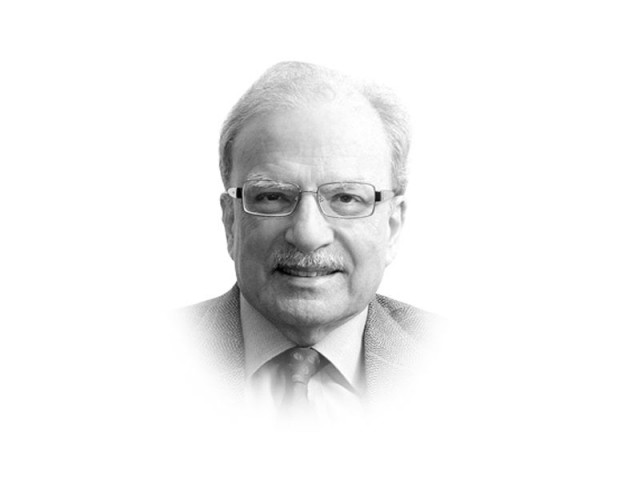Imran Khan and the changing Middle East
The decision to withdraw American troops from Syria was announced without any consultation with Washington’s allies

Imran Khan and the changing Middle East
The decision to withdraw American troops from Syria was announced without any consultation with Washington’s allies. Some European nations were deeply involved in managing the fight against the Islamic State (IS) group, and the United States was helping out. Its sudden pullout is likely to have far-reaching consequences. American troops entered Syria in 2015 during the presidency of Barack Obama. They were part of a coalition fighting the IS. At its height, the IS controlled an area the size of Britain with an estimated population of 12 million. Half of that territory was retaken by the time Trump arrived in the White House. By the closing days of 2018, the hold of the IS had been reduced to only one per cent of the territory but it was estimated that that it still had 20,000 to 30,000 footloose fighters in the region.
The Americans had won the Kurds over to their side by promising that when the mission of liberating the areas once administered by the ‘Caliphate’ was accomplished, they will stay until all the pieces had been put in place. The Americans were making the same mistake made in Afghanistan once the invading Soviet Union forces had been pushed out of the country. They left without worrying about the succession to the Soviet Union-controlled regime in Kabul.
In this context, I recall a conversation I had with President Ziaul Haq after he had fired prime minister Muhammad Khan Junejo. This was after the prime minister had the government of Pakistan sign an accord that led to the departure of the Soviet troops from Afghanistan. “I was against the move. I was of the view that the Soviet departure would result in a power vacuum in Kabul,” he told me. “The groups that had successfully fought the Soviets had given no thought to governance. All hell would break loose once the Soviet Union is gone.” The general turned out to be exceptionally prescient since that is precisely what happened and ultimately led to the emergence of Taliban and control by them of Kabul for five years. The world is still dealing with the consequences of Russia’s hasty withdrawal from Afghanistan. At that time, it was seen as the West’s triumph over Communism and the 1991 breakup of the Soviet Union.
But there is one important difference between Afghanistan in 1988 and Syria in 2019. Unlike the former, Syria now has the presence of two powerful foreign powers in that country — Iran and Russia. Both will work to install the people and the groups they are comfortable with. The result will be further loss of influence by the United States in this part of the Arab world and increased presence of Shiaism. “On Friday morning, (December 21) global leaders digested the news of the latest upheaval in Washington, the divided reaction was telling,” wrote Steven Erlanger and Jane Perlez in an assessment of the global situation for The New York Times. “Even as traditional allies were blindsided, Russia, Turkey and China offered praise.” For Britain and France, it was a time to question their involvement in both Afghanistan and Syria under the United States leadership. French Defence Minister Florence Parly said that her country’s forces were in the Middle East and engaged in Syria “in the framework of a coalition that is led by the Americans”. But now it is evident that the Trump decision “profoundly changes the situation”.
Britain, with troops fighting alongside the Americans, must also recalibrate, said Ivor Roberts, a former British ambassador. “All around for America’s allies, it’s a matter of great dismay,” he said. In Syria, “Trump has given comfort to people I wouldn’t think the United States would want to give comfort to: the Russians, Iranians and the ISIS.”
“The leverage that would have been there for the United States in Syria is no longer there because now everyone knows that the United States will leave Syria unconditionally,” said Joost Hiltermann, the Middle East director of the International Crisis, a conflict and foreign policy research organisation. The Trump decision to pull out will have enormous positive consequences for Iran, the country he has identified as America’s greatest enemy. The American president not given to deep reflection seems not to have thought-threw how his Syrian decision will affect the larger Middle East, in particular the position of Iran in the region.
Iran sent thousands of Shia fighters to battle the Sunni-led IS. Their success created an important land bridge through Syria to supply weapons to Hezbollah, a Shiite group based in Lebanon. Its principle aim was to end the Israeli occupation of the land it conquered in the 1967 war with the Arabs. Already having a presence in Iraq, Tehran is carving out a Shiite domain in the Arab world.
What do all these developments mean for Imran Khan’s Pakistan and his policies in the Middle East? It calls for nimbleness in order to keep options open with respect to the country’s immediate and not-too-distant neighbours. For the moment, the Arab monarchs are helping Pakistan deal with its financial stress. Two crown princes are set to visit Pakistan in early 2019. Getting close to the Arab monarchs could compromise Pakistan’s effort to build a representative system of governance. Also, Iran, one of Pakistan’s four neighbours, is gaining strength. Living next to it, Islamabad must stay close to Tehran.
Published in The Express Tribune, December 31st, 2018.
Like Opinion & Editorial on Facebook, follow @ETOpEd on Twitter to receive all updates on all our daily pieces.















COMMENTS
Comments are moderated and generally will be posted if they are on-topic and not abusive.
For more information, please see our Comments FAQ